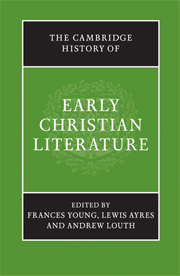Book contents
- Frontmatter
- PART ONE The Beginnings: The New Testament to Irenaeus
- PART TWO THE THIRD CENTURY
- PART THREE FOUNDATION OF A NEW CULTURE: FROM DIOCLETIAN TO CYRIL
- A LITERARY GUIDE
- 21 Classical genres in Christian guise; Christian genres in classical guise
- 22 Arnobius and Lactantius
- 23 Eusebius and the birth of church history
- 24 The fourth-century Alexandrians: Athanasius and Didymus
- 25 Palestine: Cyril of Jerusalem and Epiphanius
- 26 The Cappadocians
- 27 Fourth-century Latin writers: Hilary, Victorinus, Ambrosiaster, Ambrose
- 28 Jerome and Rufinus
- 29 Augustine
- 30 John Chrysostom and the Antiochene School to Theodoret of Cyrrhus
- 31 Cyril of Alexandria
- 32 Hagiography
- 33 Ephrem and the Syriac Tradition
- 34 The literature of the monastic movement
- 35 Women and words: texts by and about women
- 36 Conciliar records and canons
- B CONTEXT AND INTERPRETATION
- Bibliographies
- Index
- Map: The Roman Empire in the late fourth century AD"
- References
23 - Eusebius and the birth of church history
from A - LITERARY GUIDE
Published online by Cambridge University Press: 28 March 2008
- Frontmatter
- PART ONE The Beginnings: The New Testament to Irenaeus
- PART TWO THE THIRD CENTURY
- PART THREE FOUNDATION OF A NEW CULTURE: FROM DIOCLETIAN TO CYRIL
- A LITERARY GUIDE
- 21 Classical genres in Christian guise; Christian genres in classical guise
- 22 Arnobius and Lactantius
- 23 Eusebius and the birth of church history
- 24 The fourth-century Alexandrians: Athanasius and Didymus
- 25 Palestine: Cyril of Jerusalem and Epiphanius
- 26 The Cappadocians
- 27 Fourth-century Latin writers: Hilary, Victorinus, Ambrosiaster, Ambrose
- 28 Jerome and Rufinus
- 29 Augustine
- 30 John Chrysostom and the Antiochene School to Theodoret of Cyrrhus
- 31 Cyril of Alexandria
- 32 Hagiography
- 33 Ephrem and the Syriac Tradition
- 34 The literature of the monastic movement
- 35 Women and words: texts by and about women
- 36 Conciliar records and canons
- B CONTEXT AND INTERPRETATION
- Bibliographies
- Index
- Map: The Roman Empire in the late fourth century AD"
- References
Summary
Eusebius was born in the early 260s, probably in Caesarea, which was to be the centre of his activities for most of his life. He became bishop of Caesarea in about 313 (probably in succession to Agapius, who had ordained him priest and seems to have survived the Great Persecution), and died on 30 May 339. We know comparatively little about his life: a Life was written by his successor at Caesarea, Acacius, but this has been lost. This is doubtless because, though posterity valued some of his works, it had little veneration for the man and bishop, for during the controversy over the doctrines of the Alexandrian priest, Arius, Eusebius found himself on the losing side. Consequently, though a good deal has survived of Eusebius’ literary activity, it is probably only a small part of the total, which makes it very difficult to form a rounded view of him.
Three events profoundly shaped Eusebius’ life and activity. The first was his encounter with Pamphilus. Pamphilus was a great admirer of the work of Origen, though he had never known the man himself. He had studied in Alexandria under Pierius, whose devotion to Origen was such that he was known as ‘Origen Junior’ (Jerome, Vir. Ill. 76), and towards the end of the third century settled in Caesarea, where Origen had taught after his expulsion from Alexandria. There he set about restoring Origen’s heritage by making copies of all his voluminous works and continuing his labours on the text of the Scriptures.
- Type
- Chapter
- Information
- The Cambridge History of Early Christian Literature , pp. 266 - 274Publisher: Cambridge University PressPrint publication year: 2004
References
- 1
- Cited by

